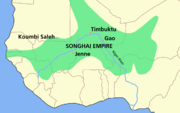
Sonni Ali
Encyclopedia

Reign
A reign is the term used to describe the period of a person's or dynasty's occupation of the office of monarch of a nation or of a people . In most hereditary monarchies and some elective monarchies A reign is the term used to describe the period of a person's or dynasty's occupation of the office...
ed from about 1464 to 1492. Sunni Ali was the first king of the Songhai Empire
Songhai Empire
The Songhai Empire, also known as the Songhay Empire, was a state located in western Africa. From the early 15th to the late 16th century, Songhai was one of the largest Islamic empires in history. This empire bore the same name as its leading ethnic group, the Songhai. Its capital was the city...
, located in west Africa
Africa
Africa is the world's second largest and second most populous continent, after Asia. At about 30.2 million km² including adjacent islands, it covers 6% of the Earth's total surface area and 20.4% of the total land area...
and the 15th ruler of the Sonni dynasty. Under Sunni Ali's infantry and cavalry, Songhai extended to cover a great portion of the Niger River
Niger River
The Niger River is the principal river of western Africa, extending about . Its drainage basin is in area. Its source is in the Guinea Highlands in southeastern Guinea...
area and gained control of crucial trading cities such as Timbuktu
Timbuktu
Timbuktu , formerly also spelled Timbuctoo, is a town in the West African nation of Mali situated north of the River Niger on the southern edge of the Sahara Desert. The town is the capital of the Timbuktu Region, one of the eight administrative regions of Mali...
(captured in 1468) and Djenné
Djenné
Djenné is an Urban Commune and town in the Inland Niger Delta region of central Mali. In the 2009 census the commune had a population of 32,944. Administratively it is part of the Mopti Region....
(captured in 1475). Sonni conducted a repressive policy against the scholars of Timbuktu
Timbuktu
Timbuktu , formerly also spelled Timbuctoo, is a town in the West African nation of Mali situated north of the River Niger on the southern edge of the Sahara Desert. The town is the capital of the Timbuktu Region, one of the eight administrative regions of Mali...
, especially those of the Sankore region who were associated with the Tuareg whom Ali expelled to gain control of the town.
He built a fleet to patrol the Niger river
Niger River
The Niger River is the principal river of western Africa, extending about . Its drainage basin is in area. Its source is in the Guinea Highlands in southeastern Guinea...
. During Sonni Ali's reign, Songhai surpassed the height of the Mali Empire
Mali Empire
The Mali Empire or Mandingo Empire or Manden Kurufa was a West African empire of the Mandinka from c. 1230 to c. 1600. The empire was founded by Sundiata Keita and became renowned for the wealth of its rulers, especially Mansa Musa I...
, engulfing areas under the Mali Empire (and the Ghana Empire
Ghana Empire
The Ghana Empire or Wagadou Empire was located in what is now southeastern Mauritania, and Western Mali. Complex societies had existed in the region since about 1500 BCE, and around Ghana's core region since about 300 CE...
before it). His death, in late 1492, is a matter of conjecture. According to the Tarikh al-Sudan, Ali drowned while crossing the river Niger. Oral tradition believes he was killed by his sister's son, Askia Muhammad Ture
Askia Mohammad I
Askia the Great was a Soninke emperor of the Songhai Empire in the late 15th century, the successor of Sunni Ali Ber. Askia Muhammad strengthened his country and made it the largest country in West Africa's history...
. He was succeeded by his son, Sonni Baru
Sonni Baru
Sonni Bāru, also known as Sonni Abū Bakr Dao was the 16th and last king of the Sonni Dynasty to rule over the Songhai Empire located in west Africa. His rule was very short, from November 1492 to April 1493. The dates of his birth and death are unknown....
, who was challenged by Askia because Baru failed to declare himself a Muslim. Askia succeed the throne. According to the Tarikh al-Sudan it is believed that this action caused Sonni Ali sister to shout out "Askia!"(forceful one), at the news of this take over.
Sonni Ali ruled over both urban Muslims and rural non-Muslims at a time when the traditional co-existence of different beliefs was being challenged. His adherence to Africa
Africa
Africa is the world's second largest and second most populous continent, after Asia. At about 30.2 million km² including adjacent islands, it covers 6% of the Earth's total surface area and 20.4% of the total land area...
n animism
Animism
Animism refers to the belief that non-human entities are spiritual beings, or at least embody some kind of life-principle....
while also professing Islam leads some writers to describe him as outwardly or nominally Muslim.http://www.globaled.org/nyworld/materials/african3.htmlhttp://www.mythinglinks.org/afr~subsahara~Songhay.html This perspectively is entirely rejected by some scholars (such as Muhammad Shareef) who claim that the debate of fusion of Islam and indigenous African religions is not peculiar, unique or in any way diminishes someone's claim to being a Muslim. Owen Alik Shahadah claims that it is problematic for historians to become theologians and narrow the definition of Islam to support their 21st century politics.

